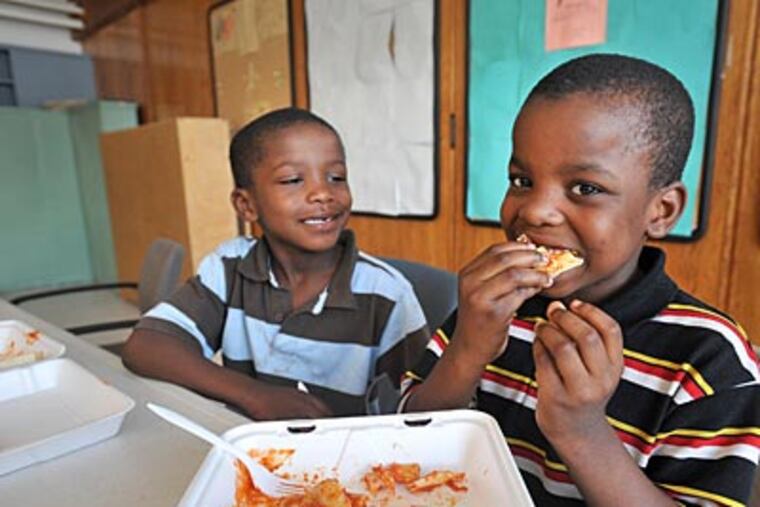Children in Philly rely on summer meal programs
Seven-year-old Jilani Schenck awaited lunch with a hungry child's demeanor: quiet, expectant, attentive. "We don't have a lot of food in the house - maybe some rice," he said in a near-whisper as he opened a hot lunch at the Philadelphia Housing Authority's Raymond Rosen Homes in North Philadelphia on Monday.

Seven-year-old Jilani Schenck awaited lunch with a hungry child's demeanor: quiet, expectant, attentive.
"We don't have a lot of food in the house - maybe some rice," he said in a near-whisper as he opened a hot lunch at the Philadelphia Housing Authority's Raymond Rosen Homes in North Philadelphia on Monday.
"I feel hungry a lot. It feels empty in me."
As schools close for the summer throughout the country, millions of children like Jilani start showing up at similar summer-feeding sites.
This year, the federally funded program has generated controversy on the Internet after the radio commentator Rush Limbaugh last week derided summer feeding programs and suggested that kids dive into Dumpsters for food.
The rate of U.S. children living in poverty this year will be around 22 percent - up from 17 percent in 2006, before the recession began - according to a new report by the Foundation for Child Development.
At 19 Philadelphia Housing Authority sites, as well as at nearly 1,000 Philadelphia recreation centers, churches, schools and community centers, officials were just starting their summer battle against hunger on Monday.
Summer is the hungriest season in Philadelphia as it is elsewhere, because an estimated 150,000 public, charter, and Catholic schoolchildren who eat free or reduced-price breakfasts and lunches during the school year are cut off, advocates say.
Estimates by the state Department of Education and others show that the meals at these city sites will feed around 80,000.
That leaves around 70,000 children without free or subsidized meals.
Throughout America, more than 20 million students eat free or reduced-price lunches during the school year. But just one in six will receive similarly subsidized summer meals, according to the Center for American Progress.
In South Jersey, where more than 70,000 students are eligible for free and reduced-cost summer-feeding programs, there is little infrastructure in place to serve summer meals, advocates say.
Making matters more difficult, fewer people give to food pantries at this time of year because donors tend to believe that family food emergencies are cold-weather related.
Yet the number of people flocking to pantries in the area continues to increase, said Adele Latourette, director of the New Jersey Anti-Hunger Coalition in Englewood, Bergen County.
"There is so much hunger out here," said Melanie LaBonte, 41, a Magnolia, Camden County, mother who was laid off from her job as an insurance agent in March. "People are hungry, struggling, searching."
LaBonte, who has a 9-year-old son, said she will sometimes forgo eating, or eat just cereal for dinner, so her son can have something more substantial.
"It gets really scary sometimes," she said.
Some people have a hard time believing that. During his program last week, Limbaugh complained about summer-feeding programs to his huge audience.
To help children find food, Limbaugh suggested they look inside "a thing called the refrigerator ... and in ... cupboards [where] you're going to find Ding-Dongs, Twinkies. . . . If that doesn't work, try a Happy Meal at McDonald's. ..."
Then he went on to say, "There's another place if none of these options work to find food: There's always the neighborhood Dumpster." He added there are videos to help kids "Dumpster dive and survive until school kicks back up in August."
Mariana Chilton, a child-hunger expert at Drexel University's School of Public Health, said she was livid.
"What he said is calculated bigotry and - is there a word for hating children?" she said. "Fast food promotes obesity, and telling kids to jump in Dumpsters conjures the image of throwing children away."
Chilton said she finds Limbaugh's words especially galling given her research with Philadelphia women.
Of 40 women given cameras to document their lives, 38 took photos of empty refrigerators, freezers and cupboards.
"They told me how horrifying it feels to tell your children there's no food," Chilton said.
She added that while summer feeding is a short-term fix, the real solution is "paying parents living wages and giving low-income people access to credit to pull themselves out of poverty."
Until that time comes, however, children like Bryan Hill, 15, of North Philadelphia, will be eating at places like PHA's Raymond Rosen site.
"My dad is a construction worker, without steady work," the boy said. "At times there's just cups of noodles in the house. It feels good to come here to eat."
To Help